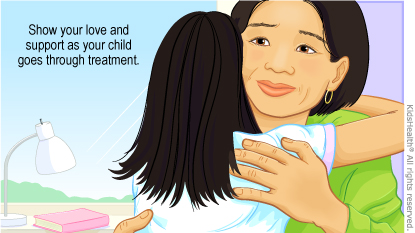Bulimia (also called bulimia nervosa) is an eating disorder where someone eats a lot of food in a short period of time (called binging) and then tries to get rid of it to prevent gaining weight. People with bulimia (boo-LEE-mee-uh) are cared for by a team of medical specialists to help them reach a healthy weight, develop healthy habits, and change the way they think about food and their body.


Follow the care team's recommendations for:
Help your child have a healthy body image.
Support your child's overall well-being by helping them:

Your child:

Your child:
If you are worried that your child may try to commit suicide (end their life) or they have talked about a specific plan for suicide, take your child to the ER.
You or your child also can call or text the National Suicide Prevention Lifeline at 988.

What causes bulimia? The exact cause of bulimia isn't clear. It probably happens from a combination of a genetic (inherited) tendency, psychological issues, and social pressure to be thin.
What are the symptoms of bulimia? People with bulimia have an extreme fear of weight gain. They binge eat (eat lots of food, even after they are full). Sometimes, this is done in private so other people don't see how much they're eating. They also use unhealthy ways to prevent weight gain from the binge eating.
Someone with bulimia might:
Some, but not all, people with bulimia may have weight changes (up or down).
How is bulimia treated? Bulimia is treated by a care team of specialists that includes doctors, behavioral health providers, and a dietitian. These experts work together to monitor the child's medical health, provide counseling, and make dietary recommendations.
Some kids can be treated at home with close follow-up with the care team. Others may go to a special program during the day to get help. Some kids need to stay in the hospital to make sure they get the treatment they need.